
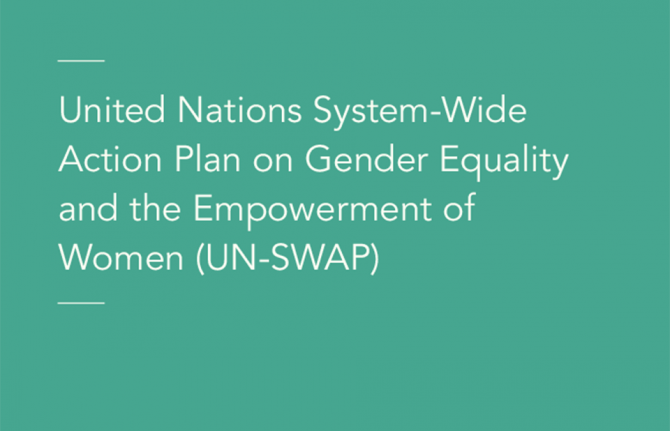
Feature Story
UNAIDS still ahead in implementing UN-SWAP
10 September 2019
10 September 2019 10 September 2019One year after the launch of the United Nations System-Wide Action Plan on Gender Equality and the Empowerment of Women 2018–2022 (UN-SWAP 2.0), UNAIDS has been rated as one of the best performing agencies in the United Nations system, meeting or exceeding all 17 of its performance indicators.
The updated and expanded action plan, implemented in 2018 across the United Nations system, was designed to accelerate progress on gender mainstreaming at all levels of the United Nations system and to provide the best overview of progress on gender equality work and the gender-related results of the Sustainable Development Goals.
The UN-SWAP reporting and accountability process is managed by UN Women, which receives annual reports on the implementation of the plan from all reporting United Nations organizations. In response to the annual report submitted earlier in 2019 by the UNAIDS Secretariat, UN Women, in a letter from its Executive Director, Phumzile Mlambo-Ngcuka, to Gunilla Carlsson, UNAIDS Executive Director, a.i., has commended the UNAIDS Secretariat on its results, in particular for its work to strengthen accountability mechanisms for gender equality and the empowerment of women through the development of its Gender Action Plan 2018–2023.
The letter also commended UNAIDS for promoting a culture of inclusion. A noteworthy example in 2018 was the introduction of a single parental leave policy that extends adoption and paternity to 16–18 weeks, depending on the number of children, and introduces surrogacy leave of the same duration. UN Women noted that “this more equitable policy framework supports caregiving by men and women and can help in overturning perceptions that women of childbearing age are potentially too expensive or an absentee risk when compared with similarly qualified men.”
In terms of progress to be made, UNAIDS was encouraged by UN Women to sustain and strengthen efforts to achieve the equal representation of women at all levels and to continue to promote an inclusive work culture, particularly through the implementation of its Management Action Plan.
“The UNAIDS Secretariat continues to be fully compliant with the UN-SWAP framework. Yet, as UN Women points out, progress is fragile and the gains made can quickly be reversed. We must do more and better to achieve the equal representation of women at all levels and continue to improve our organizational culture. These are not just boxes to tick but issues that require continuous consideration and attention,” said Gunilla Carlsson, UNAIDS Executive Director, a.i.
Along with the letter, UN Women shared a set of infographics summarizing UNAIDS’ progress against the UN-SWAP performance indicators, all of which have been compiled into a report. UN Women’s assessment is made on the basis of self-reporting and evidence submitted by each organization and validated by UN Women. For strengthened accountability, UNAIDS conducted a peer review with the Office of the United Nations High Commissioner for Refugees, which confirmed the accuracy of UNAIDS’ self-assessment.

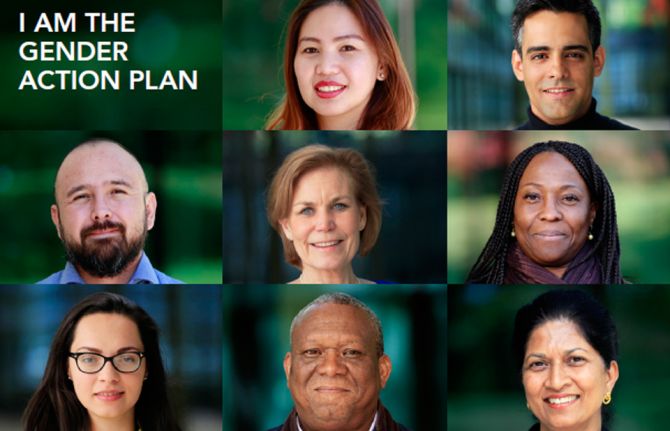
Feature Story
Leadership as a process of influence
11 June 2019
11 June 2019 11 June 2019Accelerating progress towards gender equality and the empowerment of women is fundamental to ending the AIDS epidemic. And it starts within UNAIDS.
In 2018, UNAIDS released its Gender Action Plan 2018-2023 aimed at improving the effectiveness of UNAIDS by promoting women’s leadership across the organization and ensuring that all staff, women and men, are aware of the issues that increase women’s risk of HIV infection.
The first annual progress report of the Gender Action Plan 2018-2023 shows progress in reaching its targets although much remains to be done. “The Gender Action Plan is a tool for change,” according to Gunilla Carlsson, UNAIDS Executive Director, a.i. “Building on the impressive progress made over just the first year of its implementation, it is key to keep up the momentum and sustain achievements over time.”
Of the 30 actions identified to achieve the four targets set out in the five-year Gender Action Plan, UNAIDS successfully advanced in 20 of them over the first 12 months. “The Gender Action Plan matters because it is about equality, balance, justice and fairness”, said Helene Badini, Regional Community Advisor in UNAIDS’ regional support team in Dakar, Senegal.
The Plan includes training and mentorship opportunities, mandatory gender-related work objectives, and organization-wide support. “All the staff in my office have a learning objective on gender and I advocate against all gender-based violence,” reflected Francoise Ndayishimiye, UNAIDS Country Director in Gabon. “Also, as a member of UN Plus, I like to be connected with other HIV-positive women working at UNAIDS to unite our strengths and act together,” she added.
In the West and Central Africa region, the majority of UNAIDS staff are men and half of the UNAIDS country directors are women, leading small teams in countries belonging to a region struggling with one of the fastest growing AIDS epidemics globally and severe challenges relating to security, humanitarian and natural disasters. Marie Engel, UNAIDS Regional Programme Advisor in Dakar believes that “having a network of women colleagues is a powerful and unique tool to advance women’s leadership, and this is why in my current role I am facilitating collaboration between the West and Central Africa alumnae of the Women’s Leadership Programme”.
The Gender Action Plan recalls that gender equality is a human right and critical to the performance and effectiveness of UNAIDS. The importance of advancing gender equality, including through the achievement of gender parity, is now recognized to an increased extent.
The plan, which is primarily for staff, rapidly translates into programmatic action. In the Democratic Republic of Congo, for example, UNAIDS helps women involved in civil society networks of people living with HIV to develop their skills and to reduce self-discrimination and self-stigma. Network members travelled to New York in 2018 to participate in the Commission on the Status of Women to share their experiences. The woman behind this work is Natalie Marini Nyamungu, a human rights and gender equality advisor in the UNAIDS’ country office.
“I developed skills that allowed me to create a positive work environment with equality and respect for diversity at its core, and without discrimination or prejudice,” said Ms Nyamungu. “I have also helped our civil society partners develop the new skills, resources and self-confidence that they needed to boost their own leadership.”
Supporting women’s leadership is central to the Gender Action Plan. The experience of female staff at UNAIDS has convinced many that leadership is a process of influence, not just a position in the organizational hierarchy.
Aminata Ouattara, Executive Officer in the UNAIDS regional support team in Dakar sums it up.
“UNAIDS Gender Action Plan has had the same effect as when you hop on public transport. Instead of taking your own car, the bus will fight the traffic for you and get you where you want to be much faster.”.
Related information
Related
Documents
UNAIDS Gender Action Plan - First progress report
12 June 2019
Our Gender Action Plan is a tool for transformative change with its targets and commitments paving the way towards a gender-equal workplace. I am proud to share that within just one year, we have made remarkable progress. We have put in motion nine and successfully accomplished eleven of the 30 commitments.

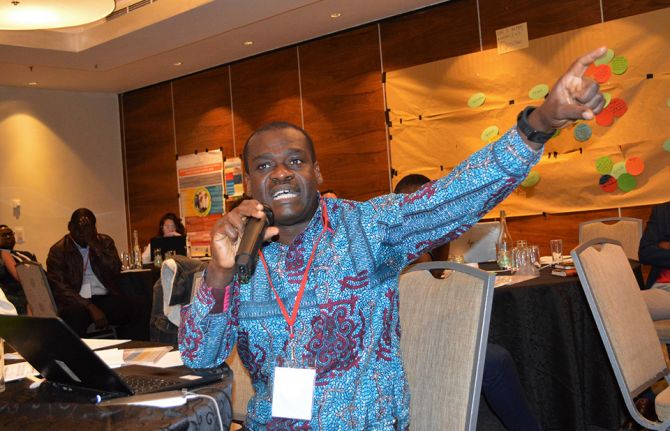
Feature Story
A life spent in the AIDS response
17 May 2019
17 May 2019 17 May 2019Isaac Ahemesah has been involved in the AIDS response for almost 25 years, the last 16 of which were spent working for UNAIDS in various positions across Africa. His most recent assignment has been as a Fast-Track Adviser in the UNAIDS Country Office in Malawi.
Mr Ahemesah’s interest in the AIDS response started in 1995, when he was studying social work at university in Ghana. As part of his studies, he was required to carry out field work at the local hospital, where there was a hospice for the many people dying from AIDS-related illnesses.
“At that time, there was no treatment for HIV. There was nothing for people living with HIV at all,” he says. “I didn’t know what I was getting myself into,” he continues. I just knew I needed to help.”
This was the beginning of his long involvement in the AIDS response. He started his professional career at the Catholic Relief Service as an HIV and AIDS Programme Officer and went on to join UNAIDS in 2003 in the UNAIDS Country Office in Ghana. Since then, he has held various positions, including Institutional Development Adviser, Human Rights, Gender and Community Mobilization Adviser in Liberia and currently Fast-Track Adviser in Malawi.
Having survived the terrorist attack on the United Nations complex in Abuja, Nigeria, in 2011 and the outbreak of Ebola in Liberia in 2013, Mr Ahemesah remains undeterred in his passion for a people-centred AIDS response.
“People living with HIV need their voices to be amplified in a way that affords them dignity and respect. Everyone needs access to HIV prevention, treatment, care and support services that are free from stigma and discrimination. We need to ensure that no one is left behind,” he continues. “UNAIDS provides me with an opportunity to turn these important principles into reality.”
Among the achievements he is most proud of during his time in Malawi is the advocacy work that he and his colleagues have been able to carry out with partners such as the United Nations Development Programme and civil society organizations. Together, they worked on the country’s HIV and AIDS Management and Control Act in 2018 to strike out or amend all provisions that criminalized people or discriminated against certain groups. This partnership ensured that the final legislation was consistent with international human rights standards and in line with model laws developed by the South African Development Community and Law Commission.
The new law has helped to create an enabling environment in which HIV services can be provided to everyone in Malawi, including lesbian, gay, bisexual, transgender and intersex people and female sex workers, who are at higher risk of acquiring HIV than the general population.
“The changes to the legal environment have allowed UNAIDS and its partners to work more openly and effectively with key populations such as sex workers and lesbian, gay, bisexual, transgender and intersex (LGBTI) people,” says Mr Ahemesah. “Six LGBTI community-led organizations are now officially registered, which means they can apply for funding, follow training opportunities and be run as fully functional organizations.”
Mr Ahemesah is happy that Malawi is making good progress towards reaching the AIDS targets, including the 90–90–90 targets. There are around 1 million people living with HIV in Malawi, of whom 90% know their HIV status. It is estimated that 71% of people living with HIV are now on treatment and that 61% of people living with HIV have suppressed viral loads.
Advances against HIV have contributed to an increase in the country’s life expectancy, from 46 years in 2000 to 64 years in 2018. Malawi was also the first country in Africa to adopt the Option B+ strategy, which ensures that pregnant women living with HIV have immediate and lifelong access to treatment to ensure that they stay healthy and that their children remain HIV-free.
During the 15 years he has spent working at UNAIDS, Mr Ahemesah has occupied many different roles. His experience will stand him in good stead as he prepares to leave Malawi later this year to take up his next assignment, as the UNAIDS Country Director in Sierra Leone, but it is his passion and commitment to improve the lives of people living with and affected by HIV that continue to be his most valuable attribute.
Region/country
Related
 “Who will protect our young people?”
“Who will protect our young people?”

02 June 2025
 Impact of US funding cuts on HIV programmes in Malawi
Impact of US funding cuts on HIV programmes in Malawi

15 April 2025

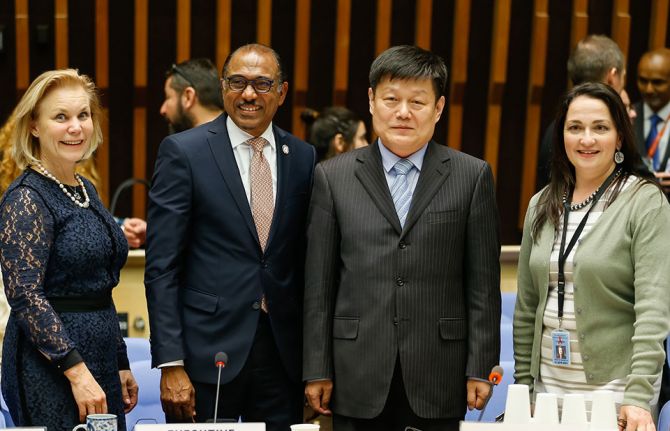
Press Release
UNAIDS presents a new plan to create a healthy, equitable and enabling environment for UNAIDS staff
01 April 2019 01 April 2019GENEVA, 1 April 2019—UNAIDS presented a new Action Plan to its Board members during a special session of the UNAIDS Programme Coordinating Board (PCB), held on 28 March 2019. The Action Plan sets out a series of priority areas that UNAIDS will be working on to create a positive organizational culture and increase the awareness of managers and staff of their accountability, rights and duties.
“We are transforming a difficult moment into a moment of opportunity,” said Michel Sidibé, Executive Director of UNAIDS. “Our Action Plan is transformative and will help us to create the model inclusive work environment that all of us at UNAIDS are committed to. This in turn will help us to be more effective as we work towards ending the AIDS epidemic.”
He reiterated that staff were UNAIDS’ greatest asset and stressed that the Senior Management Team was committed to change, accountability and transparency. He also said that the plan was designed with staff at the centre and that staff had played an instrumental role in contributing to and shaping the Action Plan.
During the meeting, the Board heard from Laurie Newell, Chair of the working group to strengthen the PCB’s monitoring and evaluation role on zero tolerance against harassment, including sexual harassment, bullying and abuse of power, at UNAIDS. Ms Newell explained that the working group will support UNAIDS in being a model organization in the United Nations system for zero tolerance for harassment and commitment to dignity and respect at work. The working group particularly appreciated the engagement of staff in the development of the Action Plan as a model for the United Nations system.
The Board members expressed their support for the Action Plan and urged UNAIDS to continue its implementation and its improvement. They expressed their wish to see the Action Plan become a pathfinder in the United Nations system to address harassment in the workplace. They also reiterated their support to the PCB working group and said that they looked forward to its recommendations at the PCB meeting in June.
The Board also heard from Yuri Ambrazevich, Permanent Representative of Belarus to the United Nations Office and other International Organizations in Geneva and Chair of the search committee for the selection of the next Executive Director of UNAIDS. He requested the support of the PCB in helping the search committee to ensure that the process remains fair and confidential for all candidates and solicited the Board’s support in bringing forward the broadest possible pool of highly qualified candidates. The Board confirmed its trust in the search committee and looked forward to the discussion of the proposed shortlist of candidates at the 44th meeting of the PCB, in June 2019.
UNAIDS Board members and representatives of United Nations Member States, international organizations, civil society and nongovernmental organizations attended the special session of the PCB, which was chaired by Li Mingzhu, Commissioner of the National Health Commission, China, with the United States of America serving as Vice-Chair and Belarus as Rapporteur.
The UNAIDS Executive Director’s report to the Board and the Board’s decisions can be found here.
UNAIDS
The Joint United Nations Programme on HIV/AIDS (UNAIDS) leads and inspires the world to achieve its shared vision of zero new HIV infections, zero discrimination and zero AIDS-related deaths. UNAIDS unites the efforts of 11 UN organizations—UNHCR, UNICEF, WFP, UNDP, UNFPA, UNODC, UN Women, ILO, UNESCO, WHO and the World Bank—and works closely with global and national partners towards ending the AIDS epidemic by 2030 as part of the Sustainable Development Goals. Learn more at unaids.org and connect with us on Facebook, Twitter, Instagram and YouTube.
Related information
Press centre
Download the printable version (PDF)

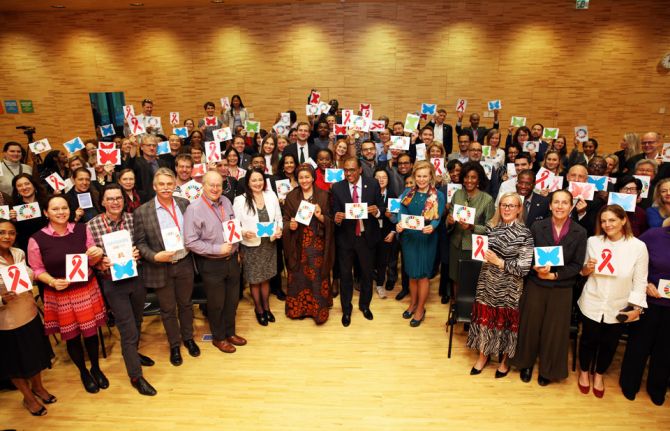
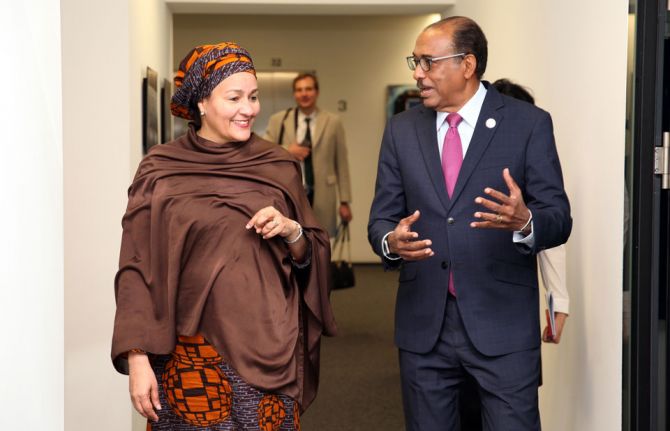

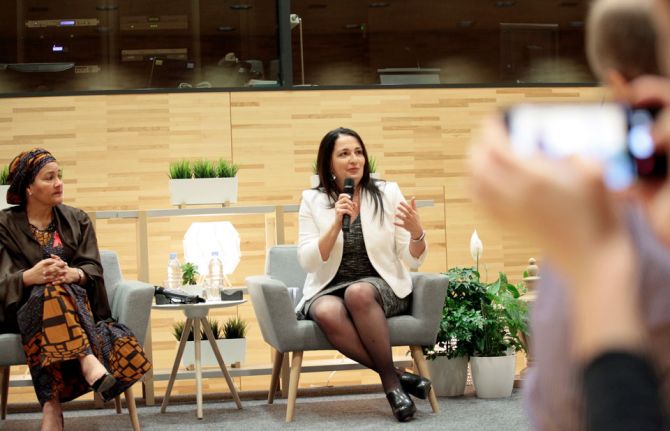
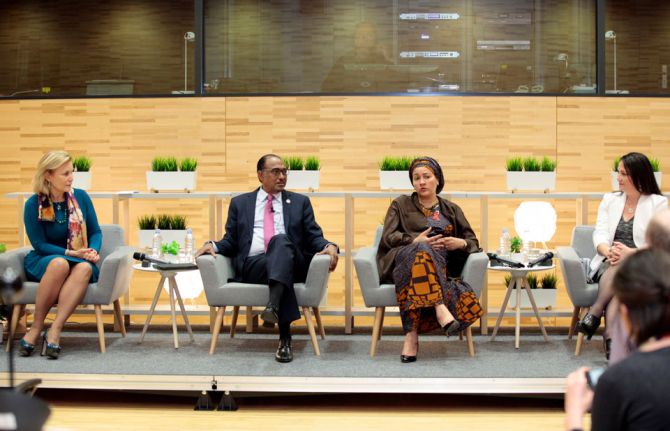
Feature Story
A vision of a reformed United Nations
22 March 2019
22 March 2019 22 March 2019“The Sustainable Development Goals are connected by the idea of leaving no one behind. In each country and every constituency, we need to define who those are and put them at the centre,” said Amina Mohammed, United Nations Deputy Secretary-General, during a visit to UNAIDS headquarters in Geneva, Switzerland, on 22 March. At the meeting she outlined her vision for a reformed United Nations that is fit to deliver against the Sustainable Development Goals.
Ms Mohammed highlighted the importance of young people and of ensuring that the next generation of United Nations staff members builds a strong future for the organization. She also spoke about the game-changing possibilities of gender parity and about United Nations reform and innovative partnerships. She reminded UNAIDS staff that, “We are all here to serve humanity and work to make a difference in people’s lives. We are not just here as professionals, we should bring more of ourselves and thereby more urgency and empathy into our work.”
Michel Sidibé, UNAIDS Executive Director, said in his welcome, “United Nations reform is not easy. It is about implementation and about the needs of countries and people. UNAIDS has been at the forefront of this agenda since the beginning and will continue to be, and we will fight for the people being left behind”.
Ms Mohammed extended her thanks to UNAIDS, stating that, “The Sustainable Development Goals would not have had the ambition to put people at the centre if you had not shown it can be done with the AIDS response. Good things come in small packages and UNAIDS’ role is essential.”
In closing, she said, “Our commodity is hope, it is the hope we give while we try to close the gap between the realities of our challenges and the aspirations of our dreams and those of many millions of people.”









